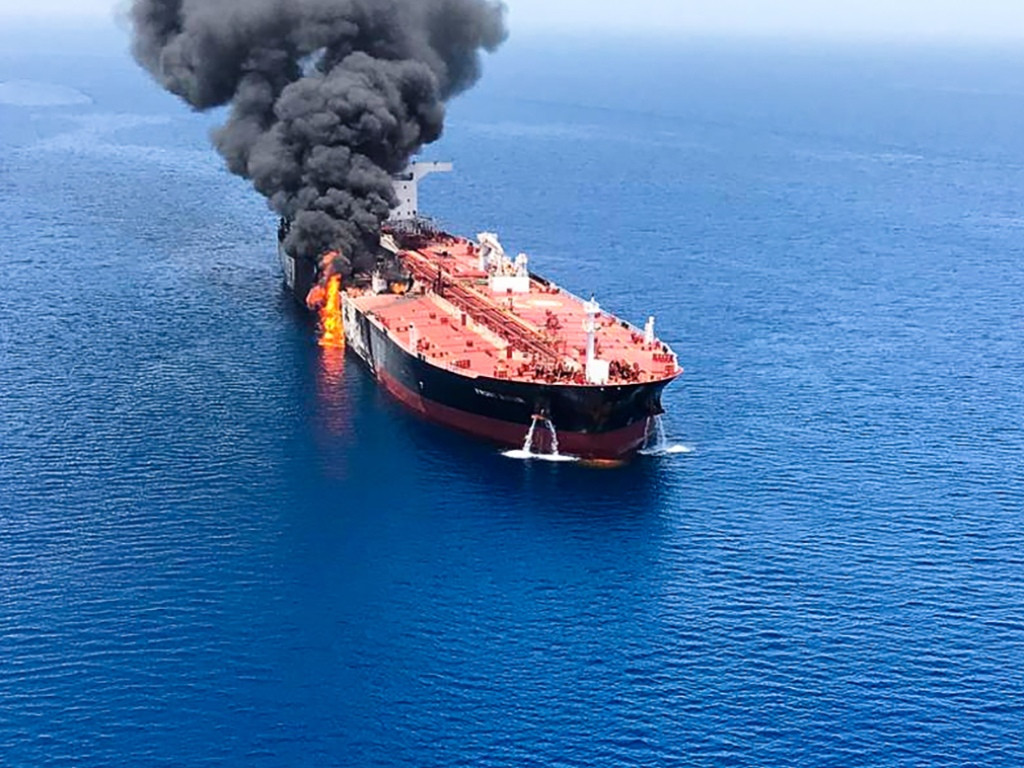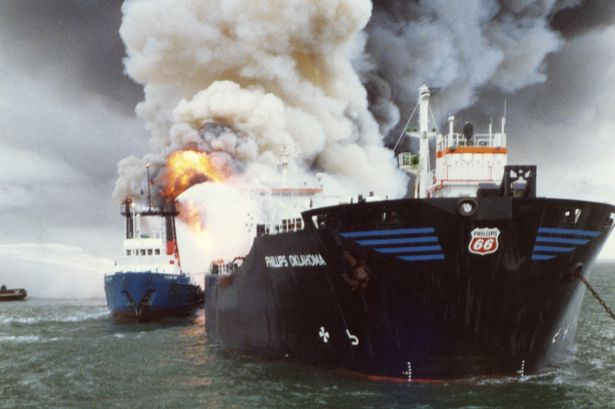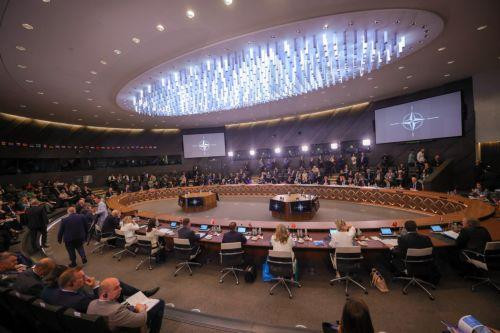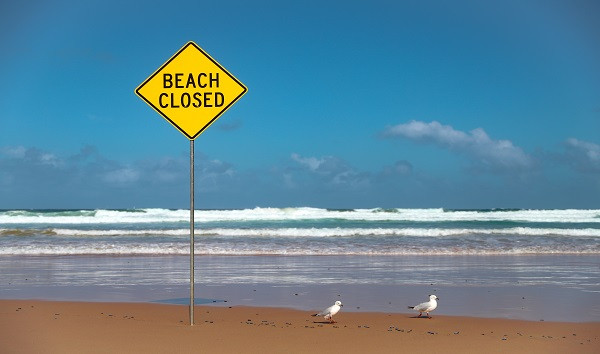A Greek-flagged crude oil tanker that was recently attacked by Yemen’s Houthis is still on fire in the Red Sea and now appears to be leaking oil, a Pentagon spokesman said on Tuesday. The Sounion was targeted last week by multiple projectiles off Yemen’s port city of Hodeidah. The Houthis, who control Yemen’s most populous regions, said they attacked it in the Red Sea, as the Iran-aligned group has been attacking ships in solidarity with Palestinians in the war between Israel and Hamas in Gaza. Pentagon spokesman Air Force Major General Patrick Ryder said a third party had tried to send two tugs to help salvage the Sounion, but the Houthis threatened to attack them. He said the tanker was carrying about 1 million barrels of crude oil.
“These are simply reckless acts of terrorism which continue to destabilize global and regional commerce, put the lives of innocent civilian mariners at risk and imperil the vibrant maritime ecosystem in the Red Sea and Gulf of Aden, the Houthis’ own backyard,” Ryder said. He added that the US military was working with other partners in the region to determine how to help the vessel and mitigate potential environmental impact.
The Iran-aligned group has sunk two ships and killed at least three crew members in their 10-month campaign, which has upended global ocean shipping by forcing vessel owners to avoid the Suez Canal shortcut. The Houthis said they attacked the tanker in part because Delta Tankers violated its ban on “entry to the ports of occupied Palestine,” Houthi military spokesman Yahya Saree had said in a televised speech.
The Sounion was the third vessel operated by Athens-based Delta Tankers to be attacked in the Red Sea this month. The attack caused a fire onboard, which the crew extinguished, Delta Tankers said in a statement.
The Pentagon says the Sounion is a navigational hazard and warns of a potential environmental catastrophe. The Greek-flagged Sounion crude oil tanker is still on fire after being attacked by Yemen’s Houthi group last week, and appears to be leaking oil, the Pentagon has said. The vessel is carrying about one million barrels of crude oil, according to Pentagon spokesperson Air Force Major General Patrick Ryder.
The United States is “aware of a third party that attempted to send two tugs to the vessel to help salvage, but they were warned away by the Houthis and threatened with being attacked,” he told reporters on Tuesday. The Sounion was attacked on August 21 by multiple projectiles off Yemen’s port city of Hodeidah.
The Iran-aligned Houthis have been targeting shipping in the Red Sea area since November, in what they call an act of solidarity with Palestinians in the Gaza Strip because of Israel’s continuing war on the enclave. The leaking tanker is both a navigational hazard and a potential environmental catastrophe, Ryder said.
“These are simply reckless acts of terrorism which continue to destabilise global and regional commerce, put the lives of innocent civilian mariners at risk and imperil the vibrant maritime ecosystem in the Red Sea and Gulf of Aden, the Houthis’ own back yard,” Ryder said. The European Union’s Red Sea naval mission responded to a request from the shipping company and the vessel’s captain and dispatched a unit to provide protection to the crew of 23 Filipinos and two Russians.
The crew abandoned the vessel and were rescued by the EU mission. There were no reports of injuries. Houthi military spokesman Yahya Saree said the vessel was targeted because its operator, Athens-based Delta Tankers, violated its ban on “entry to the ports of occupied Palestine”. The Sounion was the third vessel operated by Delta Tankers to be attacked in the Red Sea this month.
It was sailing from Iraq to Greece when it was attacked on August 21, according to Ryder. The Yemeni group has sunk two ships and killed at least three crew members since it began attacking ships with ties to Israel. Its actions have affected global shipping, prompting many ship owners to avoid the Red Sea region and send their vessels on lengthier and more costly routes around the southern tip of Africa.
Fires broke out Friday on a Greek-flagged oil tanker that was attacked by Yemen's Houthi rebels this week, with the vessel now appearing to be adrift in the Red Sea, authorities said. It wasn't immediately clear what happened to the oil tanker Sounion, which was abandoned by its crew Thursday and reportedly anchored in place.
The Houthis didn't immediately acknowledge the fire. The rebels are suspected to have gone back and attacked at least one other vessel that later sank as part of their monthslong campaign against shipping in the Red Sea over the ongoing Israel-Hamas war in the Gaza Strip. The attacks have disrupted a trade route that typically sees $1 trillion in goods pass through it annually.
The British military's United Kingdom Maritime Trade Operations center reported the fires in a note to mariners Friday night. “UKMTO have received a report that three fires have been observed on vessel,” the center said. “The vessel appears to be drifting.” A U.S. defense official, speaking on the condition of anonymity to discuss intelligence matters, said American officials were aware of the fires and continued to monitor the situation.
The vessel had been staffed by a crew of 25 Filipinos and Russians, as well as four private security personnel, who were taken by a French destroyer to nearby Djibouti, the EU's Aspides naval mission in the Red Sea said Thursday. The Sounion has 150,000 tons of crude oil aboard and represents a “navigational and environmental hazard,” the mission warned. “It is essential that everyone in the area exercises caution and refrains from any actions that could lead to a deterioration of the current situation.”
The Houthis have targeted more than 80 vessels with missiles and drones since the war in Gaza started in October. They seized one vessel and sank two in the campaign that also killed four sailors. Other missiles and drones have either been intercepted by a U.S.-led coalition in the Red Sea or failed to reach their targets.
The rebels maintain that they target ships linked to Israel, the United States or Britain to force an end to Israel's campaign against Hamas in Gaza. However, many of the ships attacked have little or no connection to the conflict, including some bound for Iran. As Iran threatens to retaliate against Israel over the assassination of Hamas leader Ismail Haniyeh in Tehran, the U.S. military told the USS Abraham Lincoln aircraft carrier strike group to sail more quickly to the area. Early Thursday, the U.S. military’s Central Command said that the Lincoln had reached the waters of the Middle East, without elaborating.
Washington also has ordered the USS Georgia guided missile submarine to the region, while the USS Theodore Roosevelt aircraft carrier strike group was in the Gulf of Oman. Additional F-22 fighter jets have flown into the region, and the USS Wasp, a large amphibious assault ship carrying F-35 fighter jets, is in the Mediterranean Sea. The US Pentagon has warned that an oil tanker attacked by Yemen’s Houthis last week is still on fire and could be leaking oil into the Red Sea, threatening an ecological disaster.
Last week the group targeted the Greek-flagged crude oil tanker Sounion with three projectiles, sparking a fire and disabling the engine. The Sounion's crew were rescued by a French naval vessel on Thursday after drifting for a day 77 nautical miles west of the port of Hodeidah. On Friday the group, which controls most of Yemen and says its attacks are in solidarity with Palestinians in Gaza, posted a video purporting to show them setting the ship alight.
The EU's Aspides task force, an international naval force, said in a statement on X that there was no sign of fire on board the ship when the crew were rescued. The tanker is carrying more than 150,000 tonnes of crude oil. Should a spill occur, it could be among the largest from a ship in recorded history. The US State Department warned in a statement on Saturday that the potential spill could be four times the size of the 1989 Exxon Valdez disaster, when 257,000 barrels of oil leaked off the coast of Alaska.
According to Aspides, the EU military taskforce against the Houthis, the wreckage risks a “severe ecological disaster”. Pentagon spokesperson Air Force Maj Gen Patrick Ryder said on Tuesday that a third party had sent two tugboats to salvage the wreck but had been deterred by Houthi threats to attack them. Ryder condemned the attacks as “reckless acts of terrorism” which “imperil the vibrant maritime ecosystem in the Red Sea and Gulf of Aden, the Houthis’ own back yard,” adding that the US military was working with partners in the region to mitigate any environmental impact.
Yemen's Ansar Allah group, known as the Houthis, started targeting any ship they deemed Israel-linked traversing the Red Sea in October 2023, vowing not to stop until Israel ends its war on Gaza. Some ships with no relation to Israel have also been targeted over recent months. While the group has so far sunk two ships - the Rubymar attacked in February and the Greek-flagged Tutor which was targeted in June - the Sounion attack marks the first time the fighters have intentionally blown up an abandoned ship.
The EUNAVFOR operation Aspides issued an update on the burning oil tanker Sounion disputing rumors on social media of oil leaks, but repeated its warning of an “imminent environmental hazard.” There are no reports of any actions to possibly avert the potential disaster while the authorities warned of additional sightings today of unmanned and maned small boats in the Red Sea and Gulf of Aden. After the images released by the Houthi late on Friday of explosions and fires on the tanker, Aspides issued an update on the situation as of Sunday, August 25. They said that when the French frigate conducted the SOLAS operation on Friday there were no visible fires. Today, they are saying there are “fires on at least 5 locations,” aboard the Sounion.
Aspides believes most of the fires are “around the hatches of the vessel’s oil tanks.” Sounion is laden with approximately 150,000 tons of crude loaded in Iraq. Aspides said that part of the superstructure is also on fire. The pictures show the bridge destroyed and the area behind the bridge on fire in an apparent attempt to disable the tanker or a potential salvage operation. “So far there are no signs of an oil spill,” reports Aspides after pictures posted over the weekend online suggested the vessel could already be leaking. “The large volume of crude oil on board,” (up to four times larger than the Exxon Valdez), Aspides however warns, “could lead to a severe ecological disaster.”
The Houthis have been silent on the potential environmental issues only asserting that the vessel was attacked due to the company’s association with Israel. However, the prevailing currents mean the oil would likely destroy fishing grounds and the environment of Yemen. Aspides contradicted reports from UK Maritime Trade Operations which suggested the Sounion is drifting. Aspides believes the vessel is still anchored in international waters. Early reports before Friday’s bombing to start the fires, said that Delta Tankers was arranging for salvage of the vessel. While emphasizing the environmental dangers, none of the authorities have suggested that a salvage attempt is now planned.
UKMTO, however, warned today of two further sightings of small boats. An unidentified vessel approximately 61 miles southeast of Muka, Yemen in the Red Sea reported seeing an uncrewed vessel at a distance of one nautical mile traveling at 8 knots. They said there were also two other small boats, approximately two nautical miles north of the unmanned vessel. No approach was reported. Earlier on Monday, UKMTO also received a report of a small boat approaching another merchant ship in the Gulf of Aden. This incident took place approximately 55 nautical miles southeast of Aden. The small boat approximately four meters in length (13 feet) had eight to ten people aboard and was “displaying a ladder but no weapons.” Security guards aboard the vessel “challenged the suspicious boat,” and UKMTO says the small boat departed the scene.
US Central Command has not provided updates since last week with unconfirmed reports that U.S. assets have been placed close to Iran to deter potential actions against Israel. DUBAI, United Arab Emirates (AP) — A Greek-flagged tanker repeatedly attacked by Yemen’s Houthi rebels in the Red Sea remains ablaze but hasn’t sprung a major oil leak in the waterway, a European Union naval command said Monday.
The attack on the Sounion marks the most serious assault in weeks by the rebels, who continue to target shipping through the Red Sea corridor over the Israel-Hamas war in the Gaza Strip. The attacks have disrupted the $1 trillion in trade that typically passes through the region, as well as halting some aid shipments to conflict-ravaged Sudan and Yemen.
Images published by the EU’s Operation Aspides, whose mission is to protect shipping in the area, showed smoke rising from multiple points along the Sounion’s deck and its bridge Sunday. Fires could be seen burning in at least nine different locations on the deck of the vessel, which had been loaded with 150,000 tons of Iraqi crude oil — roughly 1 million barrels. Some flames appeared near hatches of the tanker’s oil tanks. “So far there are no obvious signs of an oil spill,” the EU mission said. The Sounion “is both a navigational and an imminent environmental hazard. This situation underlines that these kinds of attacks pose not only a threat against the freedom of navigation but also to the lives of seafarers, the environment, and subsequently the life of all citizens living in that region.”
The U.S. State Department similarly warned about the ecological danger to the Red Sea, home to coral reefs and other natural habitats and wildlife. Footage showing explosions on board the Sounion released earlier by the Houthis and later analyzed by The Associated Press suggested that the rebels again boarded an abandoned vessel and rigged it with explosives in an attempt to sink it. “While the crew has been evacuated, the Houthis appear determined to sink the ship and its cargo into the sea,” State Department spokesperson Matthew Miller said in a statement Saturday. “Through these attacks, the Houthis have made clear they are willing to destroy the fishing industry and regional ecosystems that Yemenis and other communities in the region rely on for their livelihoods, just as they have undermined the delivery of vital humanitarian aid to the region through their reckless attacks.”
For their part, the Houthis’ al-Masirah satellite news channel highlighted the EU’s photographs and described the Sounion as being targeted for “punishment to the company that owns the ship for violating the decision to ban access to the ports” of Israel. The Sounion came under repeated attack last week by the Houthis. A French destroyer operating as part of Operation Aspides later rescued the Sounion’s crew of 25 Filipinos and Russians, as well as four private security personnel, and took them to nearby Djibouti.
The Houthis have targeted more than 80 vessels with missiles and drones since the war in Gaza started in October. They seized one vessel and sank two in the campaign that also killed four sailors. Other missiles and drones have either been intercepted by a U.S.-led coalition in the Red Sea or failed to reach their targets. The rebels maintain that they target ships linked to Israel, the U.S. or the U.K. to force an end to Israel’s campaign against Hamas in Gaza. However, many of the ships attacked have little or no connection to the conflict, including some bound for Iran.
Copyright 2024 The Associated Press. All Rights Reserved.


















